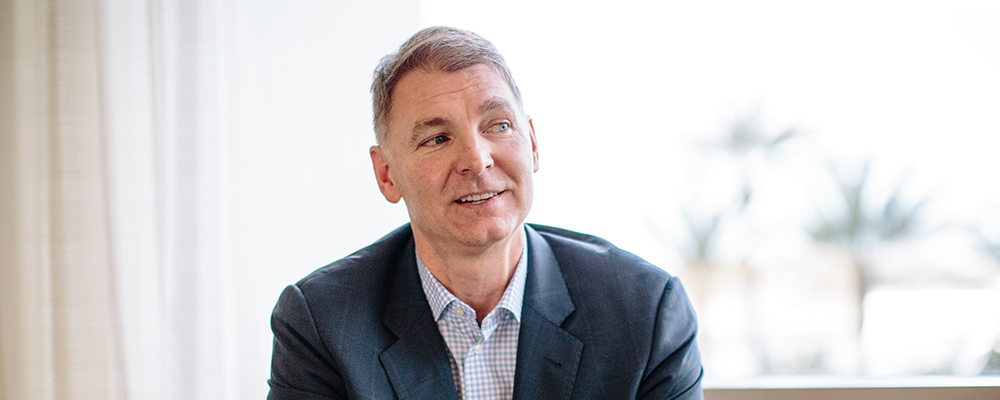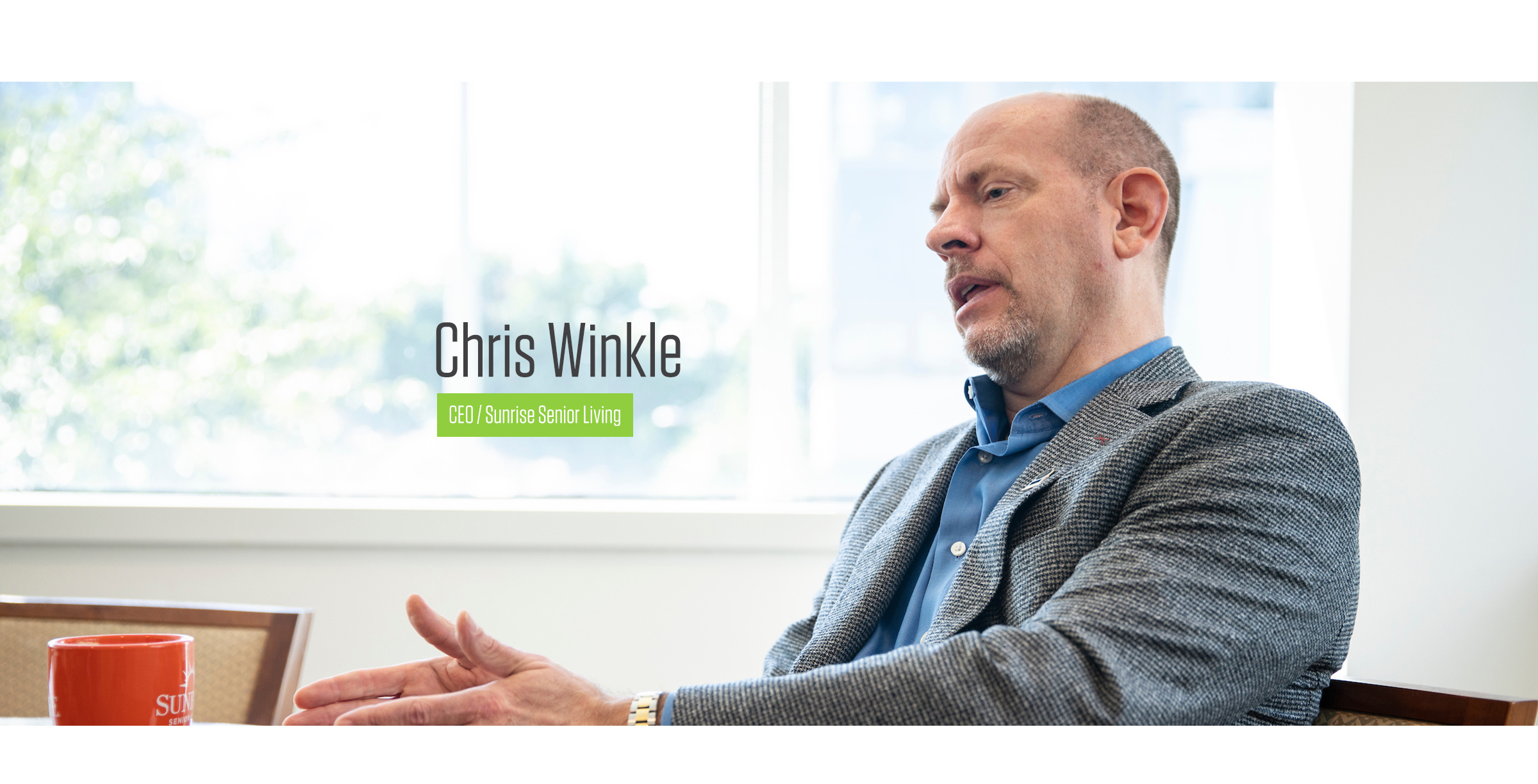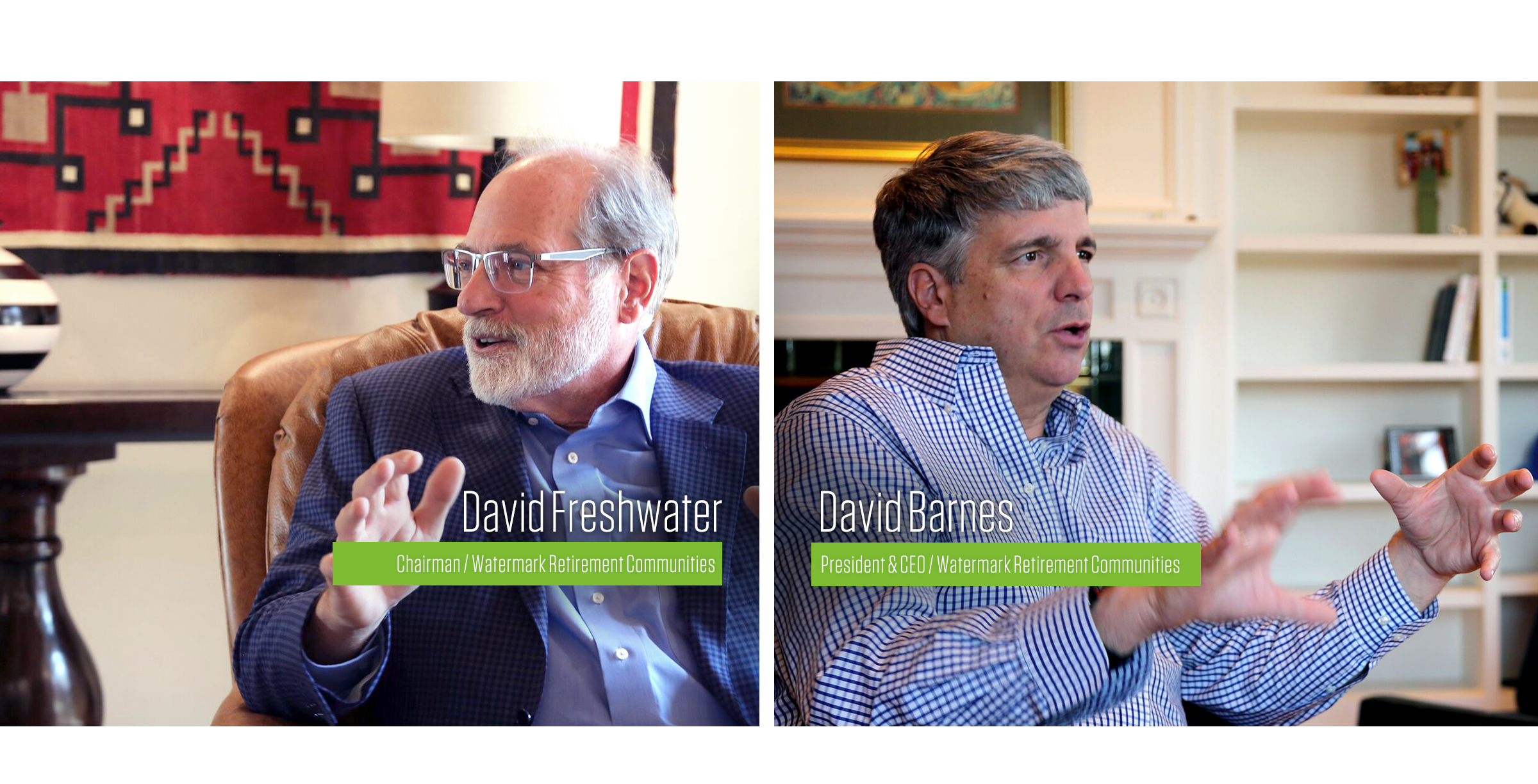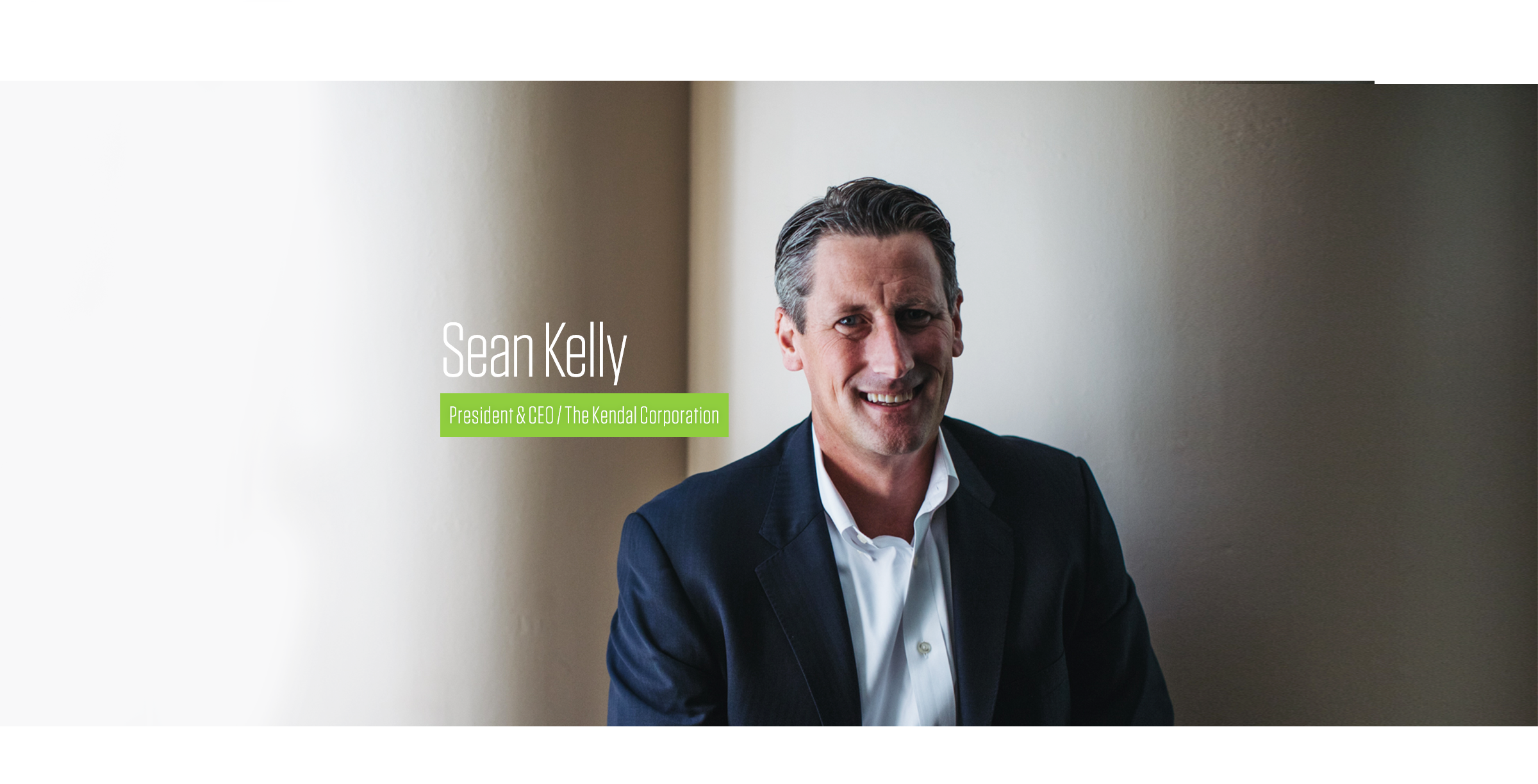Meet Greg Roderick, president & CEO of Portland, Oregon-based Frontier Management. With family roots in the skilled nursing business, Roderick learned many lessons about management and about life from his family at a young age. With strong mentorship and opportunities, including living firsthand in a senior housing community, he launched his own company in 2000. Today with 76 properties and several under development, Frontier continues to grow as a senior living owner and operator.
Spotlight on Technology
We’ve started to see the NIC data show signs of real occupancy pressure on operators, how do you think they get through this?
I think technology is really important. I think we all have huge opportunities to utilize search engine capabilities, social media, reputation management tools … There are some fantastic ways to drive census and also reduce your typical or classic advertising expenses. The traditional advertising is really struggling, versus electronic advertising is just explosive and you’re capturing people immediately. When you go visit Mom and Dad, you can literally pick up your phone and Google search whatever you need. You don’t have to wait for the Wednesday newspaper and go to page 73 or whatever.
They need to update their marketing?
Absolutely.
What about from a technology perspective on the back end of communities?
I’ve had the luxury of investing in my own technology platform since the day we started the company. We have our own platform for website design and management, lead tracking, customer relation management — to the full accounting scheme, to managing and tracking staff utilization, re-hospitalization, risk. I’ve got dashboards and platforms, and I’ve got my own app on my phone. I can push an app right now and find revenue, expense, occupancy.
We sat down with Roderick to hear his take on technology, how Frontier views employee retention, and how it came to be that some of the best beer in the nation is now brewed in-house at several of Frontier’s communities.
Tell me about how you got into senior living.
My father, Ron Roderick, followed in my grandfather’s footsteps by entering the skilled nursing industry with his best friend, Bill Colson, through Carl Campbell, a resident of Wenatchee, Washington and one of the most influential pioneer investors and landlords of our profession. Mr. Campbell had previously launched my grandfather’s career as well. As the years went by, my father and Bill (Colson) began investing in and operating retirement communities with Mr. Campbell, known as Camlu Retirement Centers. However, my father still enjoyed the nursing homes more than this new venture and, conversely, Bill found retirement living to be his calling. They separated the business and Bill moved onto launch Holiday Retirement and my father, after expanding his business, later sold to Beverly Enterprises (Golden Age).
After selling the business and investing the money in a variety of unrelated industries (mostly those which would turn out to lose money) and living a very expensive lifestyle, my father filed for bankruptcy protection and later died in an automobile accident at the age of 45. I was 20-years old and needed to use the limited skills that I had. So, I went to Holiday Retirement where Bill introduced me to a Regional Manager and I interviewed for an on-site live-in Assistant Manager position in a retirement community in Oregon. During that interview, I did my very best (best ever) and got the job. With a limited wardrobe, a great deal of enthusiasm and a ton of gratitude, I moved in and began my career at Holiday. I was recognized and routinely promoted for new and exciting assignments that included the acquisition and transition of the Resolution Trust Corporation assets where I was responsible to transition one-third of those properties and was then exposed to assisted living and memory care. Then, I was relocated to Florida as the Regional Manager. Along the way, Bill allowed me to invest in his developments and at that point, I was hooked.
You were living in Holiday’s apartments?
It was great. I moved in at 20. To me it was such a wonderful gift when I was absolutely broke.
After that I got an opportunity to move home from Florida back to Portland, Oregon, and I had met my wife at the time in Chicago, at one of the RTC takeovers in Palatine, Illinois at a building called Tamarack. Turns out, she was working there. I hadn’t been on a date in years. I lived in a retirement home. I wasn’t exactly a catch!
So I moved into that building, went out with this girl who worked there, and literally a few months later we got engaged, and a year and a half later we got married, and moved to Florida in between.
Did you live in a Holiday community at that time, too?
No, thank goodness. We built our first little house in Ormond Beach near Daytona, and created a great little life. Then we moved out to Oregon, and I became VP of operations for a company called Regent Assisted Living, which is Walt which is Walt Bowen’s company (Bowen Senior Living).
Living in Portland, my two children are now 15 and 19 and they were 2 and 5 at the time of her passing.
Today, Frontier has 80 open communities with another 5 under construction and 15 in pre-development activities throughout the United States. Additionally, I have invested in another 12 senior housing properties with friends and where others (friendly competitors) operate them.
Tell me about when you decided to go off on your own.
When I left Health Resources after just one year of being their CFO, my wife was so sick at that time she was in and out of the hospital either constantly, or living in the hospitals. So working for someone, raising two kids and caring for a wife who is passing away —frankly there was not a job in America that that model fits into. I was kind of more than anything else forcing myself into my own business.
Did you know that at the time?
It was becoming quite evident. I was racing around, hardly sleeping, driving a lot. Work, hospital, home, kids stuff. It was a great time to start the business, and the person who was the landlord or the property owner of all of the properties I was managing, was Carl Campbell. Three times over. My grandfather, my dad, and then me.
Wow.
When I went and saw him, I asked if he’d give me a shot and he goes, a Roderick? Sure! Absolutely! Third time’s the charm. Then later, his grandson bought into the company. So, Kris Campbell became my partner in Frontier. Later, Formation Capital presented an offer to Kris and they became my current partner. They’ve been great.
Did you know you wanted to be an entrepreneur?
At some point, yes. Growing up in that world, you have to learn the business. This is something that’s talked about at the dinner table. My brother, Jeff, today works for Hawthorn Retirement, a Company founded by Bart and Brad Colson, Bill’s two sons.
What did you learn from your dad?
What not to do, as much as what to do. Keep your eye on the ball. My dad loved investing in other spaces and I have done the same, but every time he invested in something outside of our wheelhouse — a major motion picture investment, drilling for water in the Middle East —these are big, expensive lessons. Every time we invested in spaces outside of our world, we tended to not do well. I’ve done a couple of those and learned my lesson. I tend to invest with people in the space, in pharmacy, or lending. When other senior housing operators come to me and ask: “Would you like to invest in my project?”’ I say, “Sure!”
A lesson to invest in what you know?
Stick with what you know as much as you can.
Do your kids want to get in the business?
I can only hope. It would be such a blessing to me. It would say a lot. I need to let them explore their own desires for awhile. All roads in my family lead back to this.
TECHNOLOGY
Tell me about the app Frontier created to help manage your communities.
There are about five companies utilizing it now, and they’re well ahead of the curve. We offer that up at a very, very reasonable price. The technology has been a game-changer.
With all these new communities that are coming onto the market, do you think it’s even more important for companies to figure out what sets them apart?
I do. In our properties, for an assisted living setting, we will create a very nice and relatively large fitness center. In about 13 or 14 of our properties we actually have a full blown micro-brewing program. Our residents actually craft their own beers. We’ve taken it to a whole new level. We also have wine programs, vodka and tequila programs.
In about 13 or 14 of our properties we actually have a full blown micro-brewing program. Our residents actually craft their own beers. We’ve taken it to a whole new level.
How did those start?
We use the Montessori methods of life enrichment. We encourage our residents to craft their crafts, do what they can for themselves, bring their life skills to the property and then encourage other people to participate in it. We’ve had residents on the front cover of the craft beer trade magazine. They’ve had national awards, and different breweries have picked up their recipe and mass produced in order to raise money for the Alzheimer’s Association. This is actually happening!
It’s like you’re breeding entrepreneurs in your community.
Exactly! It’s not something that we even hardly pay for. They just love it. They have so much fun with it. They bottle it, they have their own labels, and then they refrigerate it. We have a full lounge in most of our properties where they put it in the refrigerator and they can come out and drink it and it’s free.
Do you think the industry has done a good job in investing in technology up to this point?
I think it’s getting significantly better. There are many platforms to utilize nowadays.
One of the things we’re hearing more and more about is data. If you had a senior living executive dashboard you looked at every Monday morning, what sorts of data would be on it?
What I would like to see is what the week looks like ahead. How many care conferences and who’s going? How many tours are coming in on what days? Who are the move-ins? How many residents are at the hospitals and what for? So we can send out people to go see those people, to find out if we could have prevented something. Is there home health or hospice or a family member we can call on to help keep these people healthier, safer, and better at home? I want to make sure when people are moving in that we have the apartment ready, that they feel welcome. I’d want to see staff utilization based on the level of care and how many minutes and points. How are we staffing? Are we staffing to what the needs are? Are we overworking or underworking our staff? I want to make sure there’s ample staff for what we’re promising. If you’re charging correctly, and you’re staffing appropriately, your workers’ comp is down, your staff turnover slows, and you have a higher, more capable, enthusiastic employee going to take care of each resident. All of that flows together. I certainly like to watch revenue, expense, and profit. But that’s a byproduct of running your operations well.
…How are we staffing? Are we staffing to what the needs are? Are we overworking or underworking our staff? I want to make sure there’s ample staff for what we’re promising.
What are some strategies you guys are using to help keep staff on?
Keeping the levels of care correct and staffing it appropriately. Our employee lounges — it sounds funny — but they’re actually pretty nice. We have flat-screen TVs, complimentary food and beverage. We clean it every morning and night, make it nice, keep it well-painted and touched up. It’s really important to us.
Employees today, millennials in particular, like training. They like to hear how they’re doing. We’ve just recently, in the last six months, implemented a program where within the first 90 days, you’re going to get an evaluation three times. You’re going to get a better sense of how you’re doing. People want more immediate gratification: Am I doing better? Am I doing worse? How can I do better? New employee orientation is essential. We do quarterly employee appreciation events. Same with family appreciation. We do a family appreciation night that might just be champagne and cupcakes with a musician, and have the staff dress up and come out and meet some of the residents’ family members. It’s fun! But in our world, it’s pretty intimate. We want that social interaction between caregiver to family member.
What do you view as the types of technology that operators should be investing in?
Selfishly, having an app, there’s not a question you could ask me that I couldn’t answer in seconds. I think that’s going to be more and more important. I think medication — having EMRs, making sure you get your medication delivery system correct — is just too important. A medication error is so detrimental. I think that would be the minimum, in my opinion, to start with. Beyond that, just having more data flow so you can quickly react to problems or over expenses or too few employees. If your overtime is going wild, you want to be able to cure that and find out why that’s happening, because all of that translates to higher rent. You have to charge for these costs.
We’ve seen a big boom in ancillary services. Do you see this as a big opportunity?
I do see opportunities in ancillaries. I’ve invested in pharmacy. I’ve invested in interior design. I see it being more of a challenge to say, launch a home health care company, when I can partner instead.
So you’d rather partner than build your own?
I’d rather partner. To me, teaming up with someone is a far better structure for my point of view.
LEADERSHIP
What’s your definition of leadership?
Leadership is communication. Doing something with passion. There is no question about it, if you’re passionate about what you’re doing, it’s not just a job, it’s contagious. With leadership you have to be interested. You’ve got to get into the weeds.
Leadership is communication. Doing something with passion. There is no question about it, if you’re passionate about what you’re doing, it’s not just a job, it’s contagious. With leadership you have to be interested. You’ve got to get into the weeds.
What do you mean get into the weeds?
You have to be at the properties, you have to communicate with everyone, you have to ask a lot of questions. You should be knowledgeable. You’ve got to show interest.
Do you think it helps that you’ve been in the communities, you’ve done it, you’ve lived in one?
Yeah. My employees know my story and there’s no one I can’t identify with. I can go to the dishwasher and pat him on the back and say thanks for being here because I would probably be in your shoes right now. I’ve walked in the buildings and started washing dishes. I did it for so many years that it’s not like a hardship. I do appreciate housekeepers, dishwashers, caregivers. These people are fantastic, and they are so passionate about what we’re doing. They’re really the true unsung heroes.
During your senior housing career, what’s been the biggest challenge you’ve faced?
Pressure to do something far bigger: merge, grow, go public, take on massive debt. I am very comfortable flying in a commercial airplane. This is where my dad really taught me a lot — it’s really nice having lifestyle in check. Lifestyle is a very dangerous thing in any business. If you’re successful, you can live really well, then you disconnect from the caregiver, from the resident. I’ve got a great team, and we all live comfortably but we’re not over the top.
Was there a moment in your career where you said: Do I try and make this really big? Any sleepless nights?
There have been many a time where I’ve received fabulous offers. For example, sell a lot of properties, take a wild amount of cash and lease them back and just take a bunch of money off the table. I haven’t done it.
Why not?
I don’t want to get myself in trouble. I don’t want to be forced into making decisions based on a weaker moment of newfound wealth.
You don’t want to be forced by a REIT to have to make a decision?
Exactly. I work with a lot of REITs. I even lease a couple of buildings from them. Everything’s within check.
Sounds like you don’t want to have to answer to anybody else.
I’d rather them wave to me and say “Hey, good job,” than “Hey, ‘we need some time with you now.” I just don’t want to get in that trouble. I’ve seen so many not so good examples.
Give me an example.
Over-leveraging, only leasing not owning, not managing, just having all of your eggs in one basket.
Is it all a hedge?
It is. Maybe at one time, memory care will be completely over-bedded and we’ll all struggle … but maybe at the same time assisted living isn’t and it’s thriving. It’s just nice to have a balance.
Do you think this approach with hedging your bets — does it have anything to do with watching your dad?
I do, yeah. Even though he did a great job with the nursing homes, by selling out early and taking all of that cash, he lived really large with the airplanes and the fancy cars and all the big houses. It was short lived, unfortunately.
What’s the best piece of advice you’ve received in your career?
I think Bill Colson once said it the best: You’ll never go wrong by making the right decision, or doing right by people, something along those lines. Just always stay true to yourself. Don’t do things for money and greed. Do right by your people and make good decisions.
Who would you consider to be your mentor?
Bill Colson was my true mentor in the space. When I first started the company, he was right there for me to answer questions. I can say “I’m talking to this REIT,” for example. “Is that someone I should work with? And he’d say, “Definitely talk to this person. If you’re going to sell and lease something back, do it with this group.” He was really good to me on that. He was very good to me on teaching me how to craft the partnership, and make partners happy and not overdo it. Don’t promise too much, deliver on your promises — those types of things. What was really good was sticking to his knitting; he was really good about just sticking with what he knew.
What would you say some of your greatest strengths and weaknesses are?
I think my greatest strength is I’m very focused, I’m very disciplined, I don’t require a tremendous amount of sleep. I like to exercise. I like to eat right, take care of myself. Very focused on the future; I’m not a short-term thinker at all. I have massive, amazing hopes for plans.
My weakness is probably that I’m so focused and so completely committed that it can also take away from things.
Like what?
It can definitely take away from sleep and those types of things. I have not tried to get into the skilled side or the CCRC side or home health or hospice. Those are just spaces I have not really wanted to, and had a real desire to just dive into. I’ve seen some amazing success among our peers here, but I’m kind of leaving that to the pros and sticking more to my knitting.
Say I’m about to graduate college. What would be your pitch on why I should look to senior living as a career?
I would definitely look for most anything to do with any type of 55+, whether it’s apartment complexes, real estate, pharmacy.
Do you think the industry does a good job of taking people from the front lines and giving them a path to succeed?
I do. We have seen so much internal growth from caregiver to medication aide, to licensed nurse to becoming the RCC, to becoming health services director. A receptionist becoming a business office manager, going into marketing, then going off to be an executive director. We do see that frequently. If people have the desire, there’s probably no better space to jump into because there’s so many opportunities.
Do you think your story helps, when people hear it?
I think so. I think people actually see it. When you get to a company size of 10 buildings or more, there’s just opportunity here and there. We’ve seen a lot of people going from caregiver to life enrichment coordinator, to marketing, or maintenance or whatever. They can definitely grow.
What’s the biggest challenge the industry faces?
I will say going forward, interest rates popping up, land costs going up, construction costs going up — those things will impact our ability to attract good capital investment. It will cost more for the residents to live there, which will put pressure on seniors tomorrow. We have been in a perfectly sweet spot of low interest rates, reasonable construction costs, and better pricing and land. That great recession was a fabulous opportunity for many of us to expand and allow our residents to not have to pay what they will, say, in three or four years. It’s been great for them. They’ve been really able to open up a lot of great buildings at reasonable prices.
What do you think the future of senior living looks like?
Nicer, higher-quality properties. We are catering to today’s 60-year-old, and when we’re building buildings today, what do your parents want? What do they want to do? They want to exercise, eat right, and have a glass of wine in the evening. They’ll take beautiful walks outside and garden and take their dog out.
Can they afford it?
That’s going to be the trick down the road. We’re building to that. That is the next 30 or 40 years of what people want.









